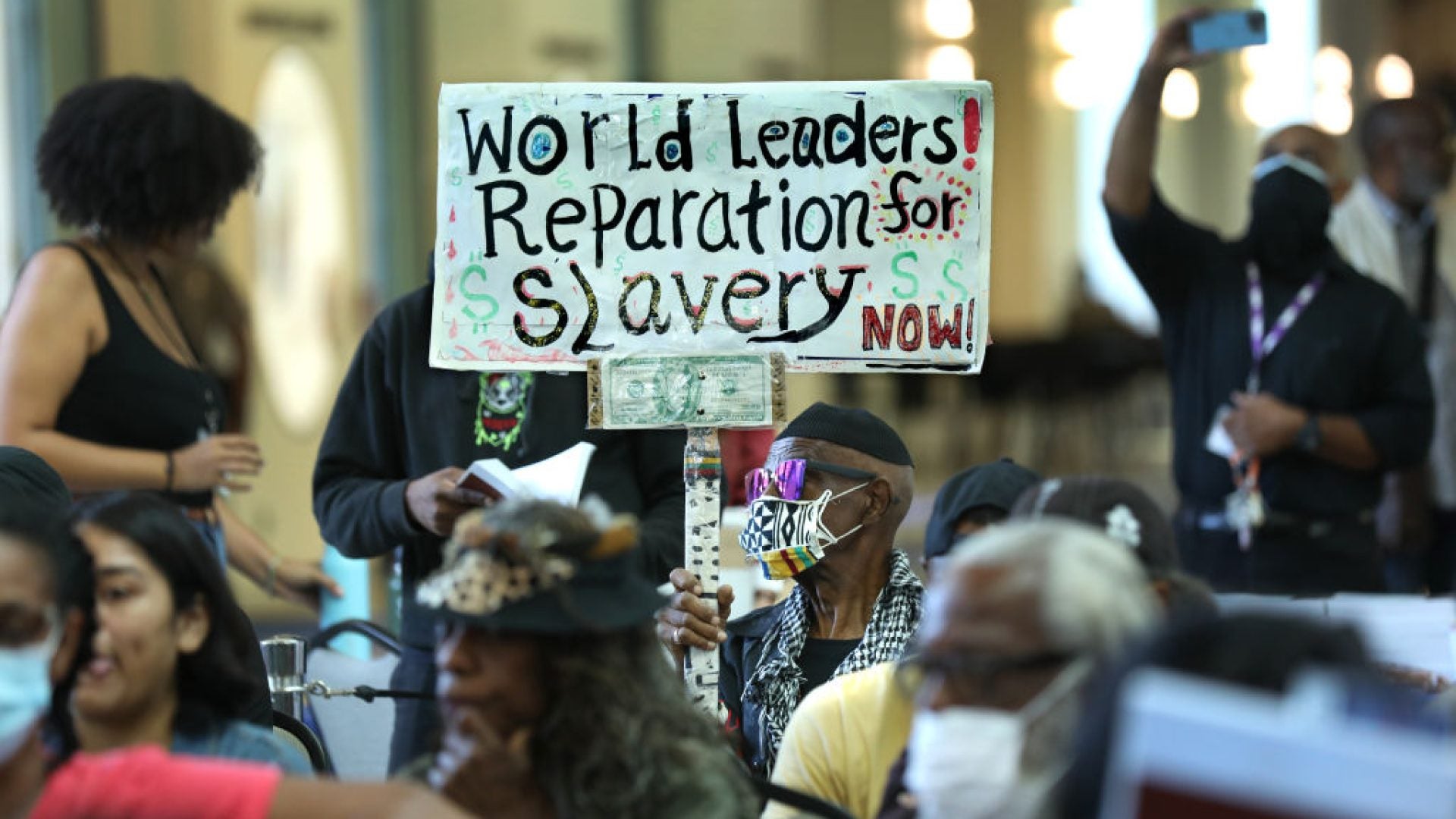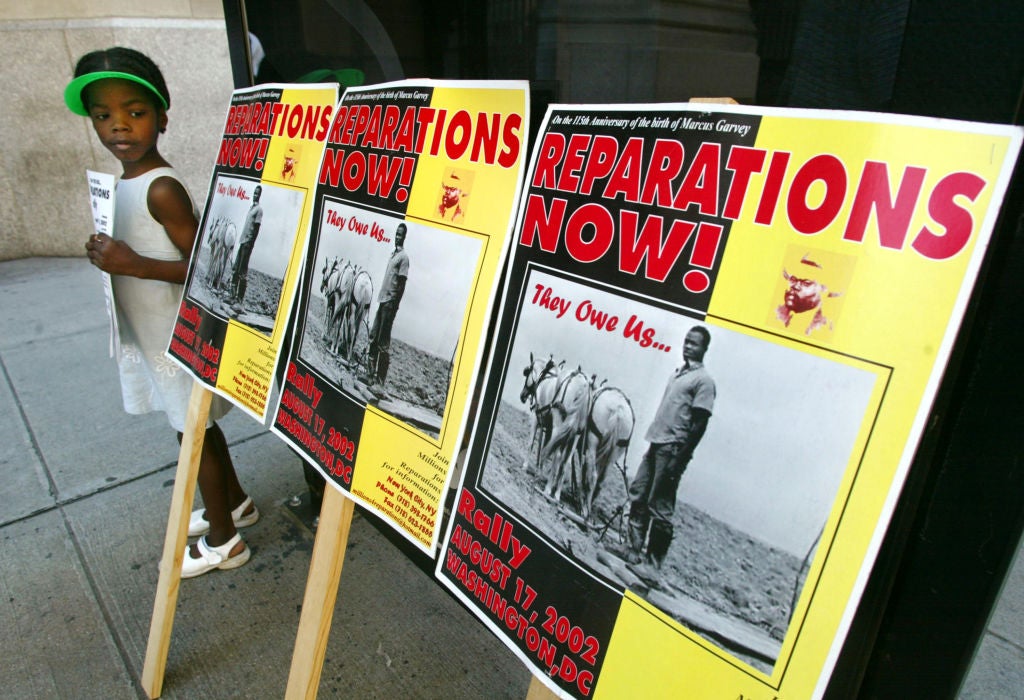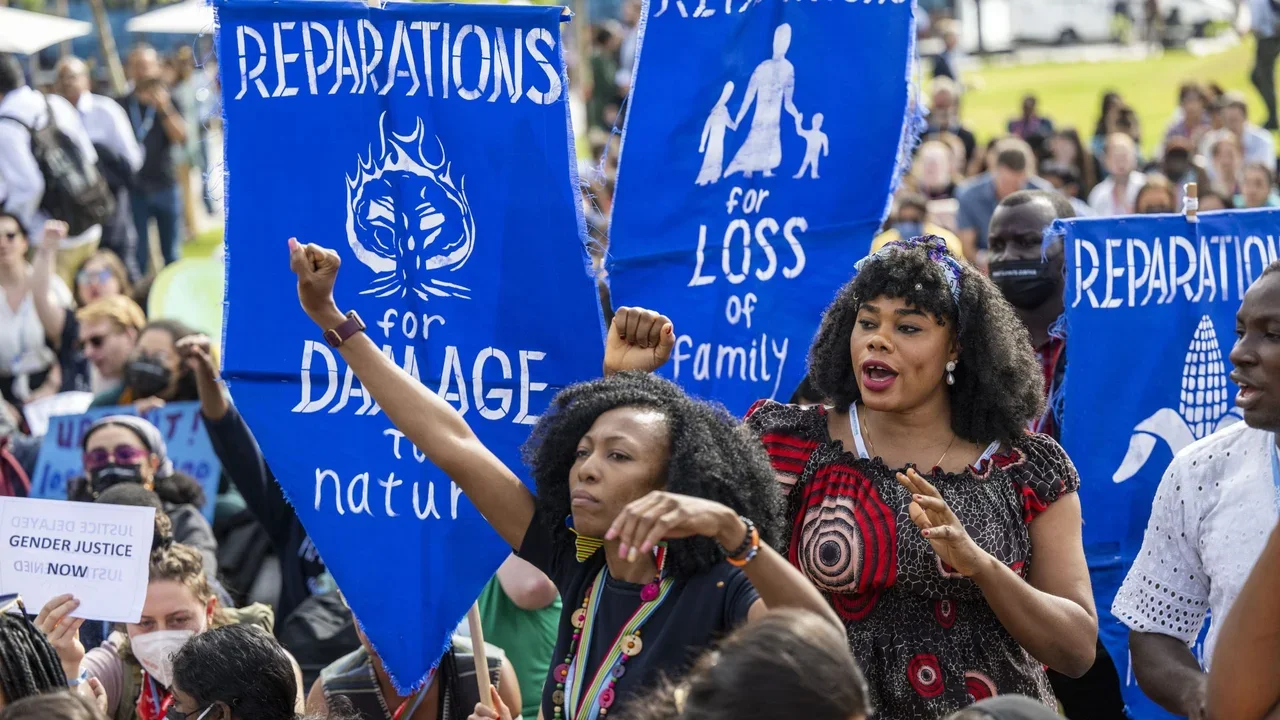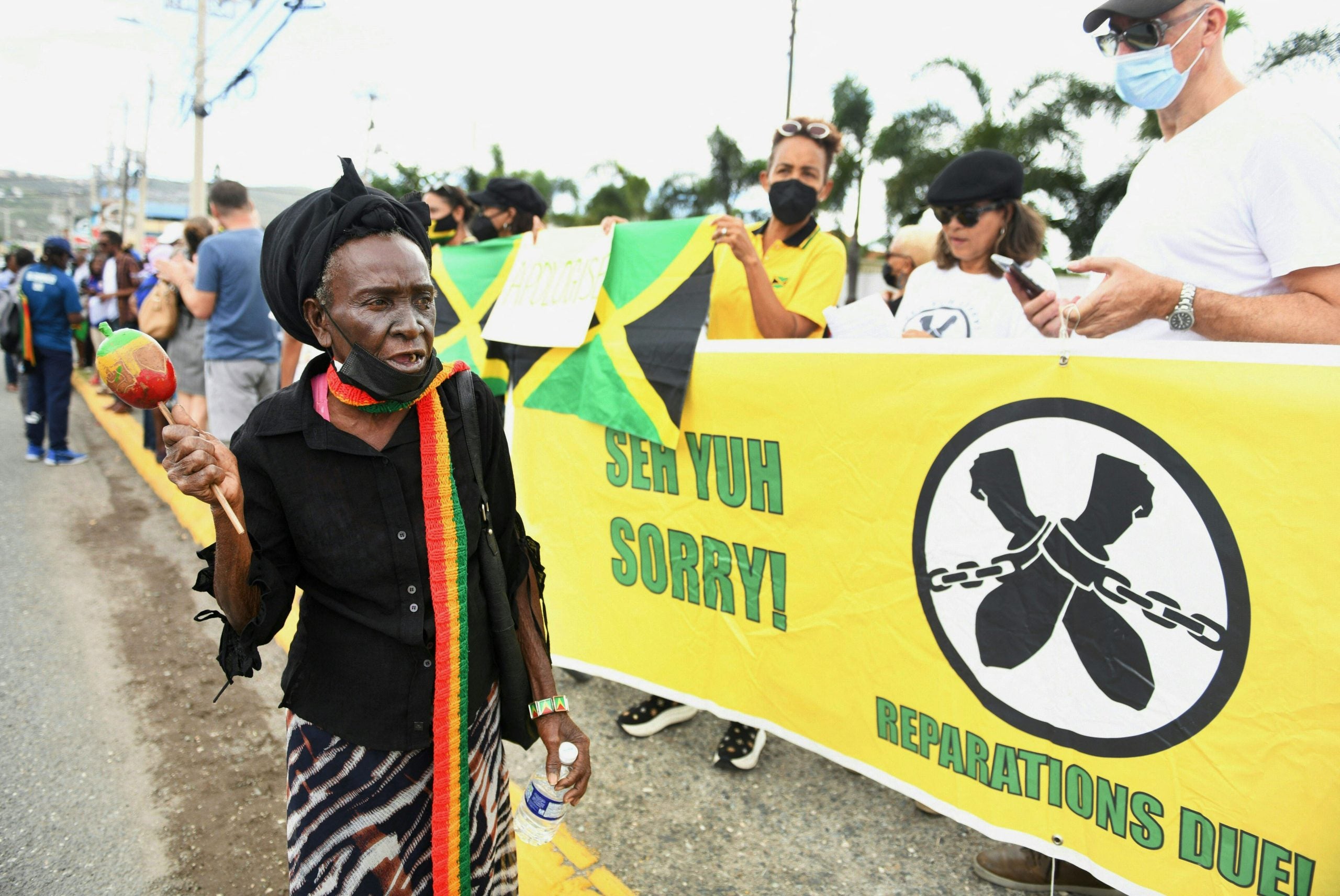
In a recent documentary on slavery’s legacy, Grenada’s lush, idyllic hills are the backdrop for a gruesome history lesson. Black historical novelist DC Campbell explains that the locale is a former sugarcane plantation. A huge, rusted roller resembling a wheel is a relic of the era.
During slavery, enslaved people would have to crush sugarcane by feeding it into the roller, but if they were unlucky enough to get their fingers caught in the iron spokes and found themselves being pulled into the wheel, an overseer would chop off their hand or arm with a machete. At least then, “that human being with one arm could still do the work which cost them their limb in the first place,” says Campbell. Another historian holds up other relics: a large whip and tiny shackles designed for small children who were enslaved.
“It’s making me feel physically sick,” says Laura Trevelyan, the BBC journalist documenting the journey, “it’s a system of profit built on torture.” But this is more than a tragic story, it’s personal. Trevelyan’s ancestors owned the plantation. As a white woman, she’s now grappling with a history that Black descendants of the enslaved have dealt with for generations.
The question of what is owed to descendants of the enslaved continues to be debated across the globe. Reparations are meant to remedy the legacy of slavery, but they have faced stiff resistance in some instances. In the US, political opposition to reparations is a major reason why H.R.40, the federal reparations bill, has languished in the House of Representatives since 1989. The argument is that slavery was long ago, and no one alive today had any hand in the slave trade.

Senate Minority Leader Mitch McConnell summed up that sentiment when he said“I don’t think reparations for something that happened 150 years ago for whom none of us currently living are responsible is a good idea.” He continued, “We’ve tried to deal with our original sin of slavery by fighting a civil war, by passing landmark civil rights legislation. We elected an African American president.”
But advocates for reparations argue the effects of slavery continue to reverberate and one Black president or the right to sit in the front of the bus hasn’t erased that. An interim report compiled by the California Reparations Task Force, the first in the nation task force on reparations —created by Governor Gavin Newsom in 2020—found 12 ways that slavery and systemic discrimination continue to affect the Black community, including health disparities, criminal justice abuses and environmental racism.
One way slavery’s legacy of systemic racism shows up is in the wealth gap. Median wealth for Black households is $24,100 to White households $188,220 according to the Survey for Consumer Finances.
Many governments and institutions involved in the slave trade still exist and are thriving, says Kamilah Moore, Chair of the California task force. “The United States is alive and well. The UK is alive and well, France is alive and well, and the same entities that were responsible and perpetuating these institutions still exist today, at least in the western perspective. And so yes, since they still exist today, they can still be held accountable today,” she tells ESSENCE.
Africa is also calling on European countries to take responsibility for not only the slave trade but colonialism and the damage it caused on the continent.
The push to have these countries make amends for the many wrongs imposed on Africa is taking several forms. In 2022, Germany returned stolen artifacts to Nigeria. In Ghana, President Nana Akufo-Addo called for reparations and justice for colonial crimes at the summit on racial healing and reparations. “No amount of money can restore the damage caused by the transatlantic slave trade — and its consequences — which has spanned many centuries, but nevertheless, it is now time to revive and intensify the discussions about reparation for Africa,” he said.

Last summer, Belgium returned the remains–just one gold tooth–of Patrice Lumumba to the Democratic Republic of the Congo. Lumumba was the nation’s first prime minister and an independence hero whose body had been dismembered and dissolved in acid. Belgium had previously apologized for its role in the assassination of Lumumba in 2002.
Belgium is also being called to account for its atrocities from Burundi, another former colony. Belgium Kidnapped biracial children from the country and from neighboring Congo and raised them in European countries during the 1940s and 50s. Burundi also wants Belgium to investigate the 1961 murder of Prince Louis Rwagasore, who, like DRC’s Patrice Lumumba, was a strong champion of independence.
Germany, which colonized Burundi from 1885 to 1924, isn’t escaping calls for accountability either. Burundi has demanded $38 million from Germany, a sum equivalent to the 424 cows Germany took from a Burundi king in 1903 for resisting its rule, but Germany hasn’t agreed to pay.
The African Union is at the forefront of the reparations push and has said that it will continue to advocate for Africa. Additionally, a huge part of its work is ensuring that Africa is no longer subservient to the West, according to John Ikubaje, Senior Political Officer in the African Union Commission.
In the diaspora, reparations are meant to ensure that descendants of the enslaved are no longer disadvantaged by systemic racism. But in the US, race has complicated reparations efforts–for example, how does one decide who would be compensated?
In California, the task force voted 5 to 4 for a lineage-based system. Only those who can prove they’re descendants of Black people who lived in the US in the 19th century are eligible (which can be done through several means, including obituaries of deceased relatives or DNA testing.)
This would exclude more recent Black immigrants, which some task force members took issue with since all Black people face racial discrimination. But focusing on lineage rather than race avoids the thorny question of whether someone’s ancestors were enslaved and includes those who may be mixed-race descendants of enslaved people.
In the Caribbean, the question of who is eligible for reparations is less murky, as Verene Shepherd, Director of the Center of Reparation Research at the University of the West Indies, points out.

“The majority of people in the Caribbean are either the descendants of Indian indentured workers or African people. I mean, those who are not descended from Africans, you know, that’s a tiny, tiny percentage of our population. So the development package will primarily benefit people of African descent,” says Shepherd, who also serves as Vice-chair of the Caricom Reparations Commission.
But who would provide the reparations would vary by country and its unique circumstances.
Jamaica, which gained independence in 1962 but still has the British monarch as its head of state, has called on Britain to pay reparations to the Jamaican people. Ironically, reparations have already been paid to the enslavers, not the enslaved. The British government took out a $27 million loan to pay slaveholders for the money they lost when slavery was abolished, and the interest on the loan was only paid off in 2015. In a Reuters interview, Mike Henry, a member of the Jamaica Labor Party, said, “I am asking for the same amount of money to be paid to the slaves that was paid to the slave owners,” which would be the equivalent of roughly $10.5 billion today.
Barbados, which declared itself a republic and removed the British monarchy as head of state in 2021, recently made headlines when it targeted the Drax family for reparations. The Drax family came to Barbados from England in 1627 and operated plantations on the island from then on. They also built the Drax Hall plantation, which is still in operation today, meaning they’ve owned the property uninterrupted for nearly 400 years while profits have accrued.
“James Drax was really the architect and pioneer of not just the sugar revolution, but also of the movement away from white indentured labor to enslaved Black African labor. So we feel that the facts pertaining to this family are so strong…that Barbados would be entitled to present him [Richard Drax] with a reparations claim,” says David Comissiong, ambassador to CARICOM and Deputy Chairman of the Barbados National Task Force on Reparations.
Comissiong says that the task force has made that recommendation to the higher governmental authorities of Barbados. While it remains to be seen how the government proceeds, the preferred method—negotiations with the family—are ongoing.
Ambassador Comissiong was careful to emphasize that this is a singular case and that most reparations claims would be targeted to national governments and institutions where there is a clear line from their operations during slavery to the present day. “It’s easier to make the link between the present and the past where you’re talking about a legal entity such as a company or a national government, as opposed to a family, another legal entity. And sometimes it’s difficult to link the present situation of the family and the past,” he says.
However, individual families do have a role to play if they choose to do so. He recalled the case of Bridget Freeman, a British woman who discovered her family had owned a slave plantation in Barbados. In 2021, she donated 1 million Barbadian dollars (the equivalent of $500,000) to the University of West Indies as a form of reparations.
“So I don’t think we should, by any means, exclude the idea of families and even individuals making gestures of reparation. I think that’s the importance of the Bridget Freeman story of a moral human being feeling compelled to take that kind of stance,” Comissiong shares.
Trevelyan also feels moved morally to do something. She describes confronting slavery’s legacy in Grenada as “deep.” While her family were absentee plantation owners, it in no way excused their participation in the slave trade. “I felt very strongly as someone who I feel that my own position in life, my own social position, has to in some way be related to the wealth of my ancestors that they got from this 200 years ago,” she says.
Trevelyan will give over $100,000 US dollars to the University of the West Indies for a new research program to study the economic impacts of slavery. She and her family will also apologize on behalf of their ancestors to the people of Grenada. “We want to do that because we hope that that will encourage the royal family in Britain to apologize for their role in slavery.”
They also hope to set an example for other families to follow. An official announcement will be made on February 27 in Grenada, coinciding with the program’s launch.
A formal apology is significant as it’s the first step of the 10-Point Plan that the CARICOM Reparations Commission has created for each of its member states. The plan includes addressing the public health crisis of chronic diseases, an Africa knowledge program, debt cancellation and psychological rehabilitation for the trauma inflicted on African descendants. It’s a community and regional development plan versus individual payments, but just as in the United States, reparations can take many forms.
Ambassador Comissiong is confident the reparations movement will continue to pick up steam and lists recent regional developments as proof. “We are making progress on reparations…on the 19th of December [2022], the Prime Minister of the Netherlands issued an apology on behalf of the Government of the Netherlands for their involvement in the crime of enslavement.”
“The Anglican Church of England, they too, issued an apology and they have done a report on the links between the church’s major 10 billion pound endowment fund and its roots in the slave trade. They have admitted wrongdoing and guilt. They have indicated that they are establishing a 100 million pound investment fund…that will fund reparative projects for communities that were impacted by historical slavery,” he says.
Back in the United States, both the form of what reparations would take (direct cash payments, housing grants, education etc.) and who exactly would pay for it varies, although in California’s case, the hope is that the state will pick up the tab. The task force’s full report including those recommendations will be released by July 1, 2023.
In every instance, however, reparations represent the repair of harms imposed on the descendants of slavery and giving a hand up (not a hand out) to our communities, says Shepherd. “We want to live in a society where we feel as if, you know, the benefits of our ancestors have come down to us. And we can live a more respectable life. That’s what we want. You know, so it’s not a begging bowl. It’s a demand for what is owed to us… it’s justice, for crimes committed against a whole set of people with this continuing harm because of what you did.”